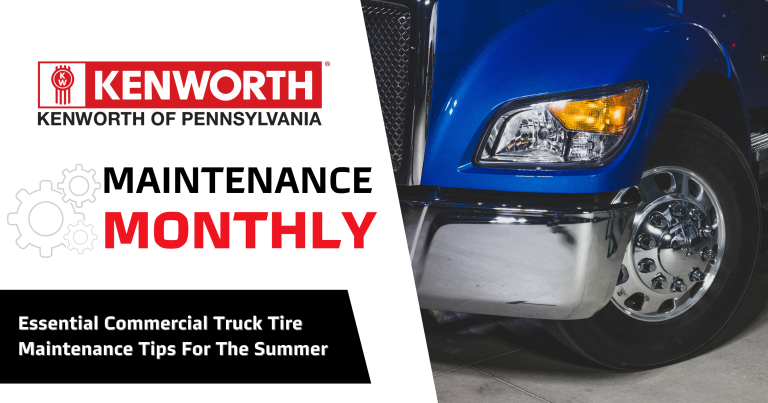
Tires are one of the most critical components of any commercial truck, and one of the most expensive to replace. From managing a fleet to driving long haul, proper tire maintenance is not just about extending tire life, it is about safety, fuel efficiency, and avoiding costly downtime. With summer right around the corner, it is the perfect time to revisit your tire maintenance routine and understand how rising temperatures can make existing problems worse.
As temperatures climb, tire maintenance becomes even more crucial. Here is why:
Tire pressure tends to fluctuate based on temperature, weight, and driving conditions. Checking pressure regularly, especially before driving while the tires are still cold, can help prevent under inflation or over inflation. Inaccurate tire pressure can lead to increased wear, reduced traction, and a higher risk of tire blowouts. When checking tire pressure, make sure to use a high-quality digital or dial gauge, and compare readings against the truck or tire manufacturer’s recommended PSI.
Worn tire tread reduces traction, especially in wet or uneven road conditions. Keep an eye out for uneven wear patterns, bald spots, and embedded objects.
Wondering what the DOT tire regulations are for commercial trucks? The Federal Motor Carrier Safety Administration mandates that the legal minimum tire tread depth is 4/32” on steer tires and 2/32” on all other tires. However, consider changing them earlier if you frequently travel long distances or haul heavy loads.
Tires should be regularly inspected for any cracks, bulges, punctures, or exposed steel belts. Seeing any of these issues may mean there is internal damage, even if the tire is still holding air. Do not ignore signs of dry rot or sidewall damage, as they are leading indicators of tire failure.
Rotating tires helps promote even tread wear across all axles. While tire rotation schedules can vary by truck and load type, the National Highway Traffic Safety Administration recommends that you rotate your tires every 5,000 to 8,000 miles or at every service interval.
Misalignment can cause tires to wear unevenly and reduce overall fuel efficiency. If a truck pulls to one side or if the steering feels off-center, that is an indicator that you should get an alignment check. This is especially important after the winter season, when potholes and rough roads may have taken a toll.
Unbalanced tires lead to vibrations, irregular wear, and driver fatigue. Make tire-balancing part of your regular maintenance routine, especially if you notice uneven wear or changes in ride quality.
Tire maintenance should be a year-round priority, but with summer approaching, it is even more critical to monitor carefully. Regular inspections, pressure checks, and smart preventive care can dramatically reduce your risk of tire-related issues when temperatures soar. As the summer heat approaches, now is the time to double down on your tire maintenance practices. A few minutes of attention can help save potentially thousands in repair costs, and more importantly, help keep drivers and cargo safe on the road. Interested in learning more about proper tire maintenance? Contact our trusted service experts at a Kenworth of Pennsylvania store nearest to you.